All products featured are independently chosen by us. However, SoundGuys may receive a commission on orders placed through its retail links. See our ethics statement.
Best earbuds for iPhone
February 6, 2025




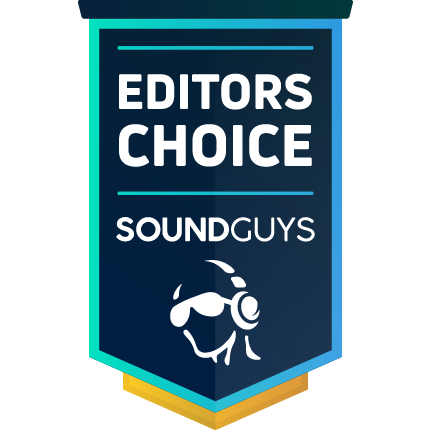

Take SoundGuys’ quiz to find your best fit
Even though most iPhone owners’ quest for the perfect earbuds begins and ends with the iconic AirPods, there are plenty of other alternatives you might be missing out on. Sure, when it comes to the Apple ecosystem, the AirPods Pro (2nd Gen) are the best earbuds for most people. But maybe you aren’t ‘most people’ and want to find something of better value to suit your needs. Regardless, we’re here to help you choose which set of earbuds is right for you.
Why is the Apple AirPods Pro (2nd Gen) the best iPhone earbuds?
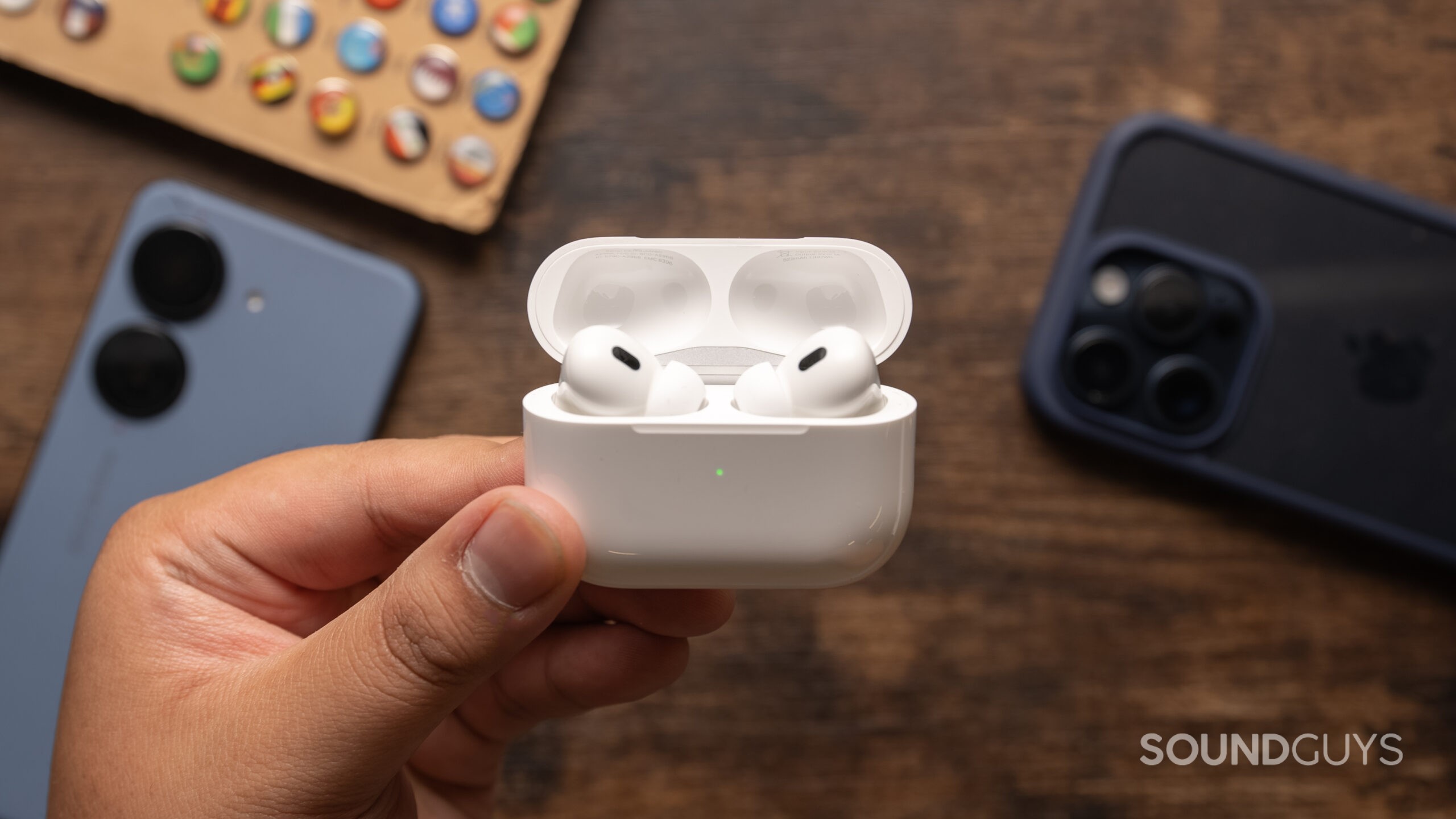
The Apple AirPods Pro (2nd Gen) is our top choice for iPhone users. It offers seamless integration with iOS devices and significant improvements over its predecessor. The H2 chip enhances active noise canceling, particularly effective at reducing low-frequency sounds. The new USB-C version boasts improved durability (IP54 rating) and promises support for low-latency, lossless audio.
Reasons to Buy:
- Seamless integration with Apple devices
- Excellent active noise canceling (ANC)
- Personalized Spatial Audio
- Improved sound quality with H2 chip
- Find My functionality for both earbuds and case
- Adaptive Transparency mode for safer ambient listening
- Multiple ear tip sizes for better fit (XS, S, M, L)
Reasons Not to Buy:
- Expensive compared to some competitors
- No built-in EQ adjustments (requires third-party app)
- May not fit all ear shapes comfortably
These earbuds excel in features tailored for the Apple ecosystem, including personalized Spatial Audio, easy device switching, and Audio Sharing. The Adaptive Transparency mode intelligently minimizes sudden loud noises while keeping you aware of your surroundings. Battery life is solid, with nearly 6 hours of playback (ANC on) and up to 24 hours with the charging case.
The sound quality is impressive, with a well-balanced profile that slightly emphasizes bass, making it suitable for most music genres. The always-on Adaptive EQ ensures consistent audio quality regardless of fit. While the AirPods Pro 2 lacks built-in EQ adjustments, the overall sound signature should satisfy most listeners.
The integration of the U1 chip in the case, coupled with a built-in speaker, makes finding lost earbuds or the case itself much easier through the Find My app. Multiple ear tip sizes and the ear tip fit test help ensure a comfortable, secure fit for most users.

While the AirPods Pro 2 offers great integration with Apple devices, there are reasons to explore the alternatives:
- Better value for money from competitors
- More customization options, especially for sound EQ
- Potentially better fit for some users
- Support for higher quality codecs when used with non-Apple devices
- Wider device compatibility beyond the Apple ecosystem
Quick Specs
- Dimensions: Earbud: 30.9 x 21.8 x 24 mm, Case: 45.2 x 60.6 x 21.7 mm
- Weight: Earbud: 5.3g, Case: 50.8g
- Water resistance: IPX4 (earbuds and case), IP54 for USB-C version
- Battery life: 5 hours 43 minutes (ANC on), 24 hours total with case
- Connectivity: Bluetooth 5.3, Apple H2 chip
- Codecs: SBC, AAC
Loading chart ...
Through the bass and mids, the AirPods Pro (2nd gen) closely follows our house curve and only makes significant deviations above 8kHz. Most listeners won’t be too bothered by the relative under-emphasis (compared to our house curve) in the uppermost octave. Harmonic detail may be harder to hear during particularly busy segments in your favorite tracks, but we prefer this to the alternative.
The chart below shows how the sound of the Apple AirPods Pro 2 was assessed by the Multi-Dimensional Audio Quality Score (MDAQS) algorithm from HEAD acoustics.
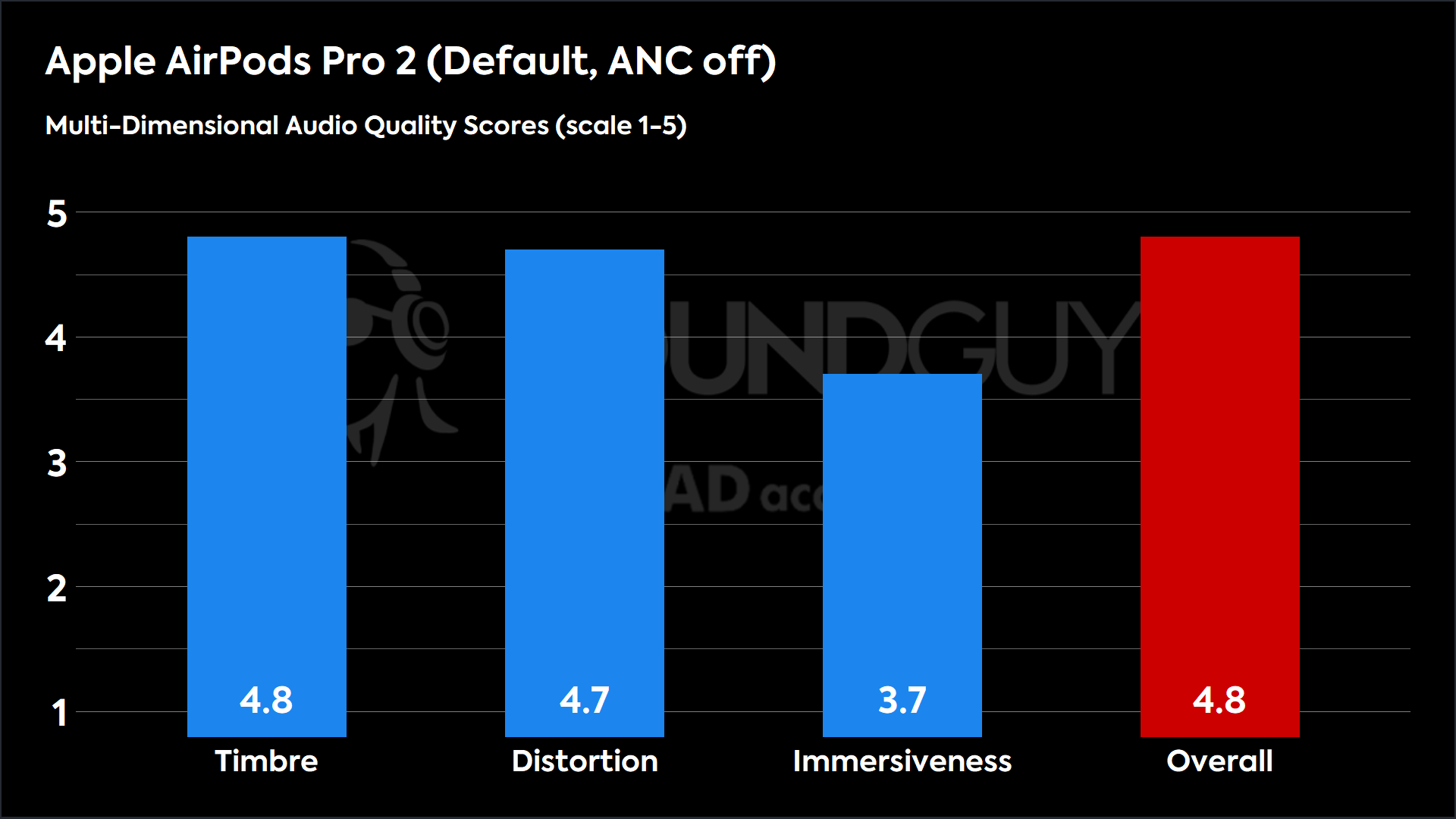
On the backs of super high timbre and distortion scores, the Apple AirPods Pro (2nd Generation) offers very high sound quality. Though the immersiveness score is merely “good,” when your weakest score is still relatively high, you’re in a solid spot. As MDAQS was developed to stand in for a quick simulated listening test by hundreds of people, a high score here means that it’s a very good bet that you’ll most likely enjoy these earbuds’ sound quality.
Loading chart ...
Though the isolation is nothing to write home about, the ANC will destroy between 20-30dB of outside noise, depending on the frequency. That’s a respectable result for ANC earbuds, and this product should be well suited for commutes, air travel, or casual listening in a noisy environment.
Best value earbuds for iPhone: AirPods 4
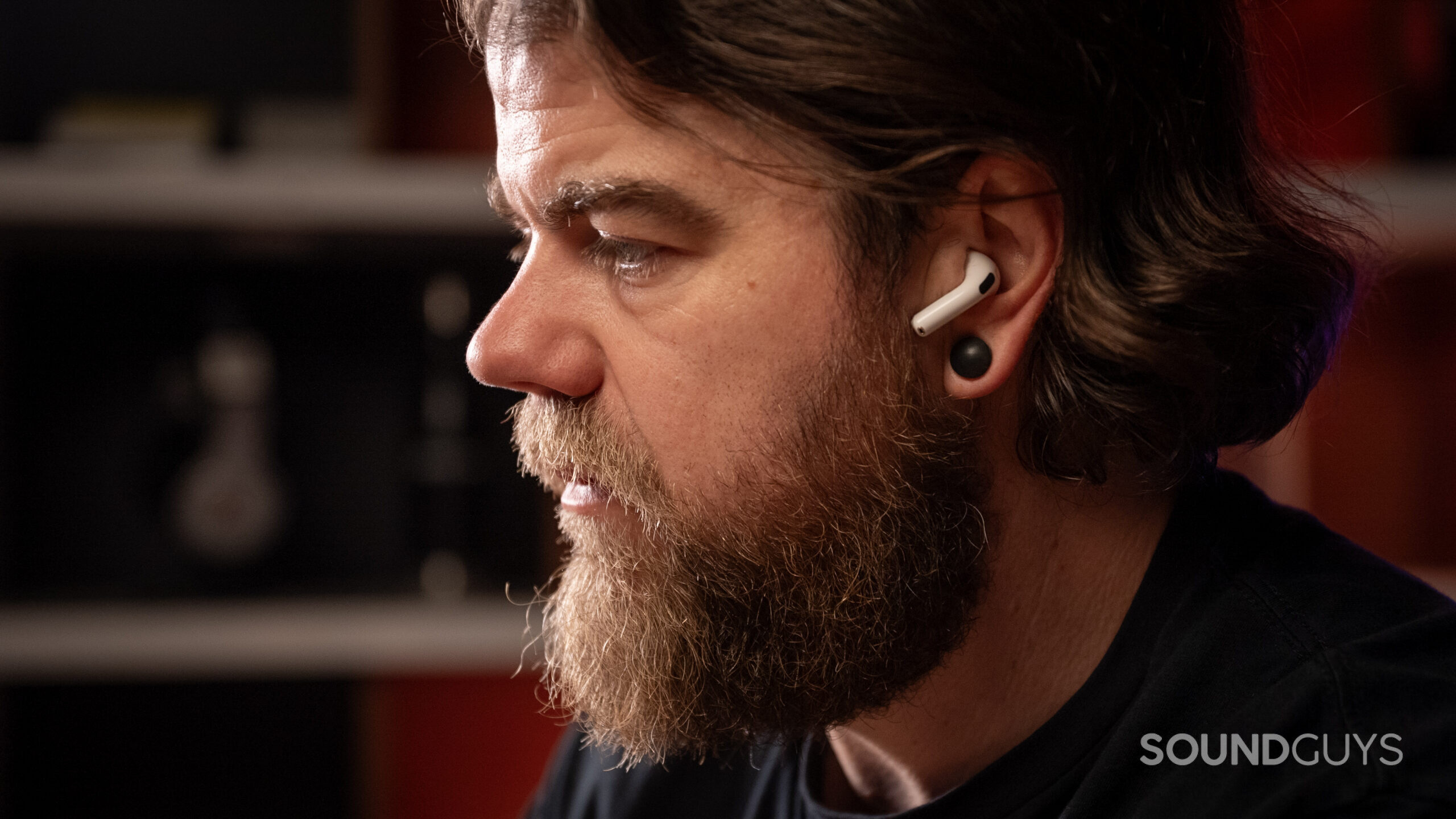
The AirPods 4 represent Apple’s most affordable entry into true wireless earbuds, offering impressive features and seamless iOS integration at a lower price point than previous models. These earbuds introduce a redesigned shape and improved sound quality while maintaining the classic open-ear design that many users prefer.
Reasons to Buy:
- Excellent iOS ecosystem integration
- Improved fit and comfort for many users
- H2 chip for enhanced connectivity
- More affordable than previous AirPods ($129)
- Good sound quality with Adaptive EQ
- Highly portable design
Reasons Not to Buy:
- One-size-fits-all design doesn’t work for everyone
- No noise isolation or ANC
- Limited features on non-Apple devices
- No wireless charging
The redesigned shape of the AirPods 4 aims to provide a better fit for more users, though the success largely depends on your ear shape. While they don’t offer noise cancellation, they do feature Personalized Volume that automatically adjusts based on your environment. Sound quality is impressive for open-ear earbuds, with clear mids and highs, though deep sub-bass is naturally limited by the design.
Battery life is solid at 6 hours and 21 minutes of continuous playback, with the charging case providing up to 30 hours total. The case charges via USB-C, and a quick 5-minute charge provides an hour of listening time. The earbuds support Bluetooth 5.3 with the AAC codec, ensuring reliable connectivity with Apple devices.
The AirPods 4 include features like audio sharing, spatial audio with head tracking, and seamless switching between Apple devices. The improved microphone quality with AI noise processing makes them excellent for calls and video conferences. With an IP54 rating, they can handle light rain and workouts, though they lack secure-fit accessories for intense activities.

Quick Specs
- Dimensions: Earbud: 30 x 18 x 18 mm, Case: 46 x 50 x 21 mm
- Weight: Earbud: 4.3g, Case: 32.3g
- Water resistance: IP54
- Battery life: 6 hours 21 minutes, 30 hours total with case
- Connectivity: Bluetooth 5.3
- Codec: AAC
Loading chart ...
The AirPods 4 feature a prominent bass bump around 100Hz that helps compensate for the open design, though there’s a steep rolloff below 60Hz. The mids and highs are generally well-balanced, with a slight overemphasis in the 2kHz region that can make sibilant sounds more prominent. There’s also an intentional underemphasis in the 3-6kHz region, which might make some music sound slightly less clear, though the earbuds maintain excellent treble extension into the highest frequencies.
The chart below shows how the sound of the AirPods 4 was assessed by the Multi-Dimensional Audio Quality Score (MDAQS) algorithm from HEAD Acoustics.
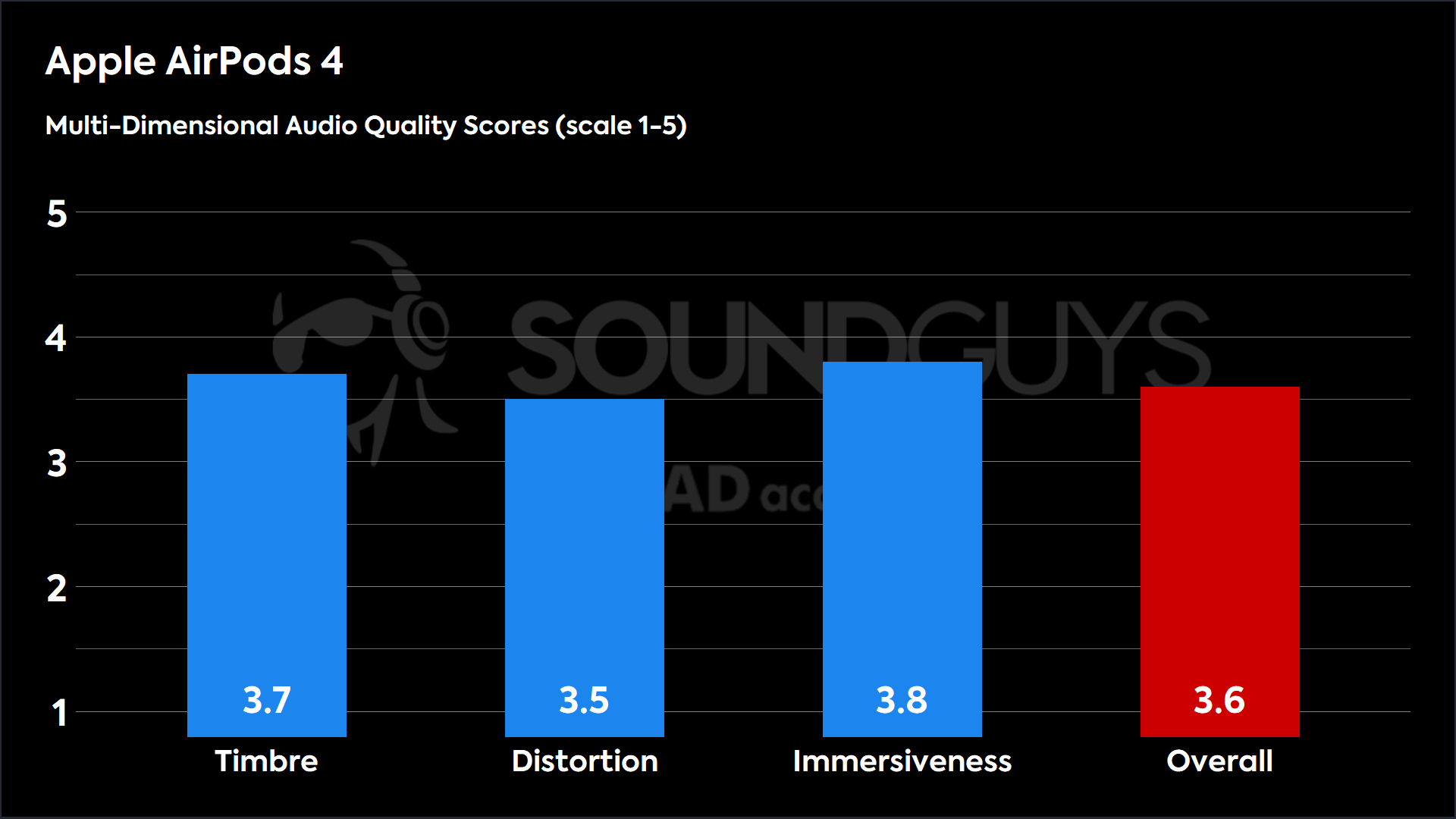
These scores are typical for unsealed earbuds and are quite similar to competitors like the Samsung Galaxy Buds3. The results represent real-world performance without perfect fit assistance, making them a realistic representation of daily use.
Loading chart ...
Due to their open design without silicon ear tips, the AirPods 4 provide very minimal noise isolation. They don’t actively block outside noise, making them less suitable for noisy environments like city streets or public transportation. While they include Personalized Volume to automatically adjust sound levels based on environmental noise, users seeking significant noise reduction should consider the AirPods 4 with Active Noise Cancellation or the AirPods Pro 2 instead.
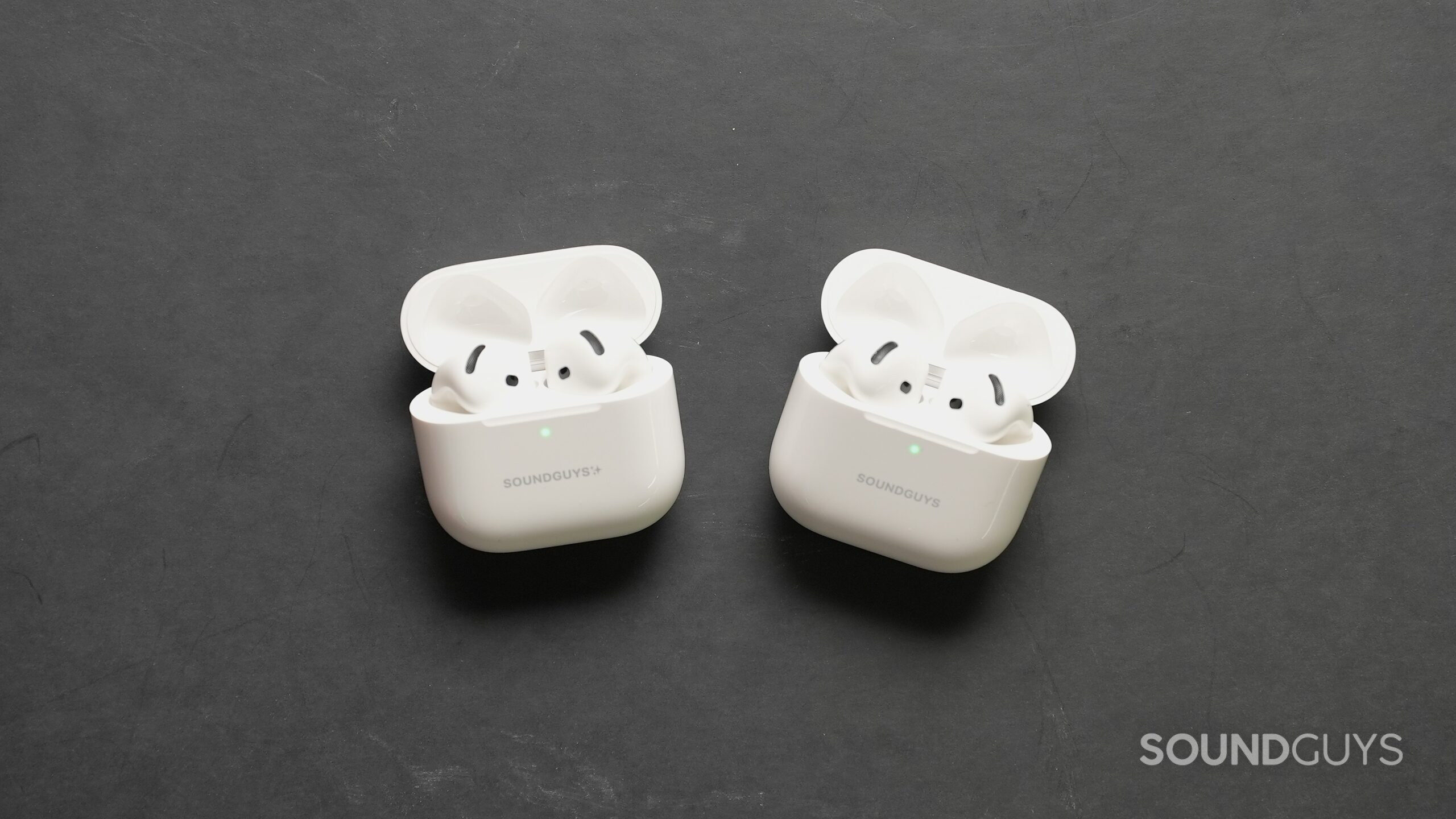
While both models share the same redesigned shape and core features, the AirPods 4 with ANC offers several premium features for an additional $50. The ANC version adds active noise cancelation that can reduce about 20dB of noise in the mids and highs, though low-frequency noise can still penetrate due to the unsealed design. You’ll also get additional features like Adaptive Audio, Conversation Awareness, wireless charging support, and a built-in speaker in the case for Find My functionality.
However, if you’re specifically looking for noise cancelation, you might want to just buck up for the AirPods Pro 2 instead. The unsealed design of both AirPods 4 models fundamentally limits their noise-blocking capabilities, regardless of ANC. The AirPods Pro 2’s silicon tips provide much better isolation and more effective noise cancelation. At a typical street price a bit higher than the AirPods 4 with ANC, they represent better value for those seeking true noise reduction.
In short, the standard AirPods 4 remains the best choice if you prefer an open design and want to save money.
Best workout earbuds for iPhone: Beats Fit Pro
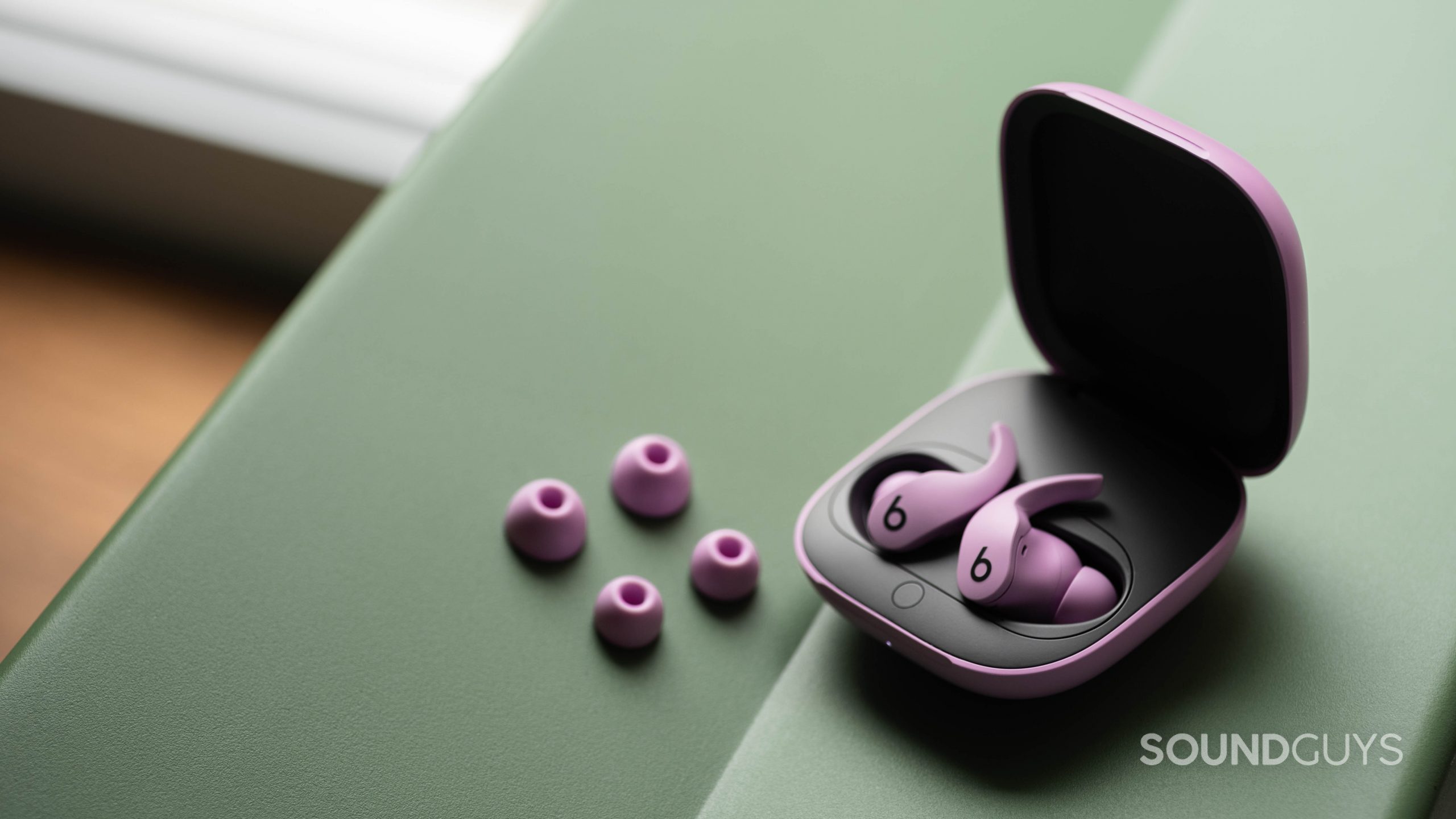
We recommend the Beats Fit Pro to iPhone users looking for versatile workout earbuds. These earbuds combine the best features of the AirPods Pro with an athlete-focused design, making them suitable for intense workouts and everyday use.
Reasons to Buy:
- Integration with iOS devices
- Good active noise cancelation (ANC)
- Secure fit with wing tips, ideal for workouts
- Supports personalized Spatial Audio (iOS only)
- In-app ear tip fit test
Reasons Not to Buy:
- No wireless charging for the case
- Larger case compared to some rivals
The Fit Pro’s secure fit, thanks to its wing tips and multiple ear tip sizes, ensures they stay in place during vigorous activities. The IPX4 water resistance rating protects against sweat and light rain, making them reliable for various workout environments.
Sound quality is bass-heavy, which many athletes will appreciate to motivate them during workouts. However, this may not suit all listeners for casual listening. Unfortunately, there’s no built-in EQ, so you’ll need to adjust through your streaming service or a third-party app for more customized sound.
The active noise cancelation is very good, comparable to the AirPods Pro 2. This feature is particularly useful in gym settings to block out background noise. The transparency mode allows you to stay aware of your surroundings when needed.
For iPhone users, the H1 chip enables seamless integration with iOS devices, including features like personalized Spatial Audio with head tracking. Battery life is solid, with over 6 hours of playtime with ANC on, and the case provides additional charges for a total of 24 hours. Fast charging is available, but the case lacks wireless charging capabilities.

Quick Specs
- Dimensions: Earbud: 30 x 24 x 19 mm, Case: 62 x 62 x 29 mm
- Weight: Earbud: 5.6g, Case: 55.1g
- Water resistance: IPX4
- Battery life: 6 hours 22 minutes (ANC on), 24 hours total with case
- Connectivity: Bluetooth 5.0, Apple H1 chip
- Codecs: SBC, AAC
Loading chart ...
You get plenty of bass emphasis, which is typical of workout earbuds. Beats keep the treble emphasis pretty consumer-friendly, so you can still hear flutes, violins, and hi-hats amid bassier segments. This kind of frequency response does best with pop, hip-hop, and rap music, and it’s no coincidence that these are the most popular workout music genres.
The chart below shows how the sound of the Beats Fit Pro was assessed by the Multi-Dimensional Audio Quality Score (MDAQS) algorithm from HEAD Acoustics.
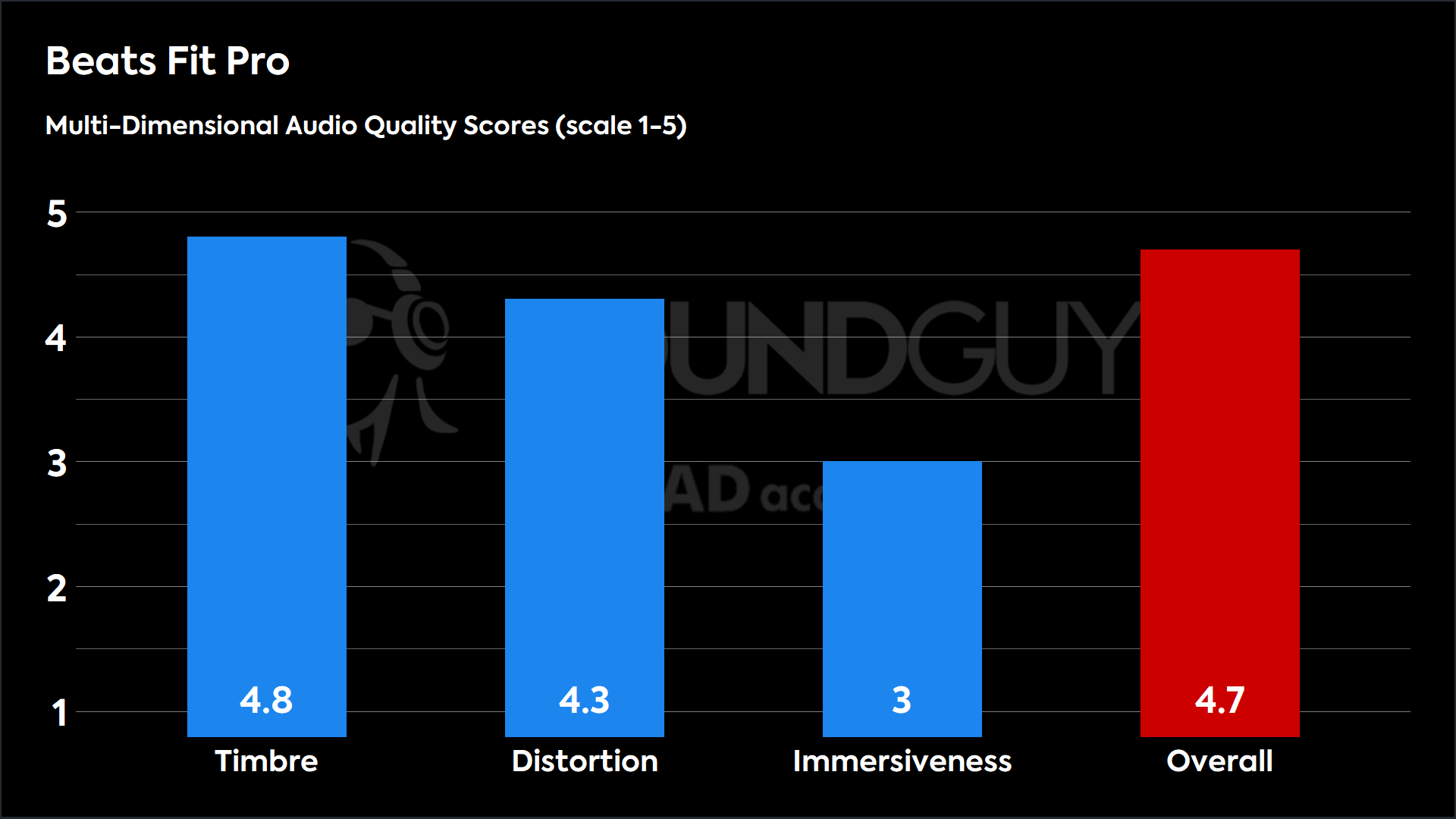
The Beats Fit Pro scored fairly highly in Timbre with little Distortion, even if it is a little low in Immersiveness. Still, most people will likely enjoy the sound of the Beats Fit Pro.
Loading chart ...
Overall, with active noise canceling enabled, the Beats Fit Pro reduces about 80% of the perceived loudness of outside noise, provided you get a good seal.
Best earbuds under $150 for iPhone: Nothing Ear
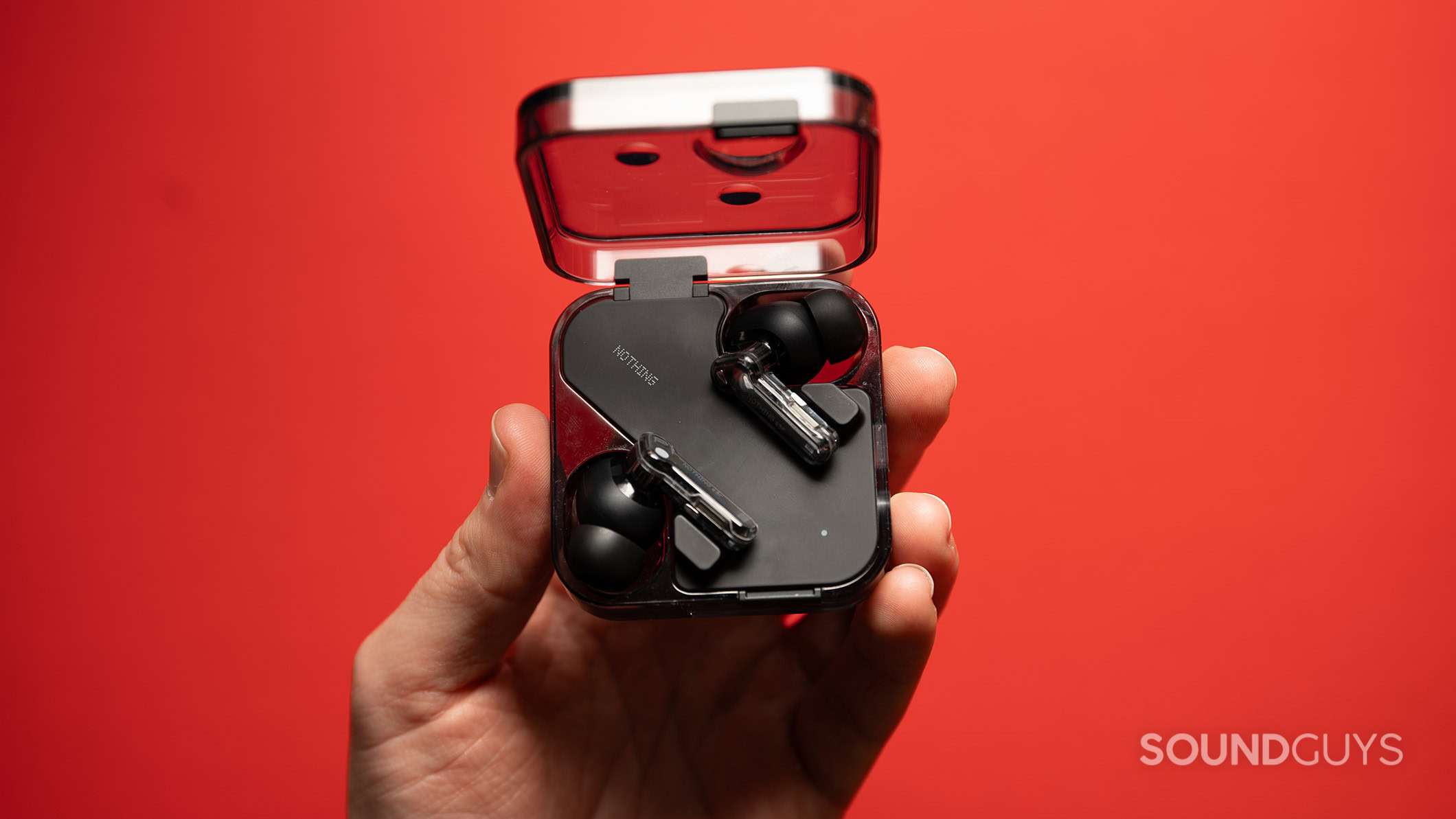
The Nothing Ear offers iPhone users a mix of premium features and performance at a more affordable price point compared to the AirPods Pro 2. These earbuds have a unique transparent design, lightweight comfort, and impressive sound quality.
Reasons to Buy:
- Good sound quality
- Comprehensive app with advanced parametric EQ
- Comfortable and lightweight design
- Good active noise cancelation and transparency mode
- Competitive price point
- Solid battery life
Reasons Not to Buy:
- High-quality codecs (LDAC, LHDC) not supported on iPhone
- Some connection drops were reported in busy areas
- Changing ANC settings affects sound quality
The 11mm ceramic diaphragm drivers deliver excellent audio performance, with a wide soundstage and impressive clarity. The Nothing X app provides extensive customization options, including an advanced parametric EQ for audiophiles and a Personal Sound Profile feature that adjusts frequencies based on your hearing ability.
While the active noise cancelation is good, reducing most sounds by around 75%, it doesn’t quite match the performance of top-tier competitors. The transparency mode, however, is excellent for quickly hearing your surroundings without removing the earbuds.
Battery life is solid, with over 8 hours of playback time per charge and up to 40 hours total with the case. Both wireless and fast USB-C charging are supported, adding to the convenience. The IP54 rating for the earbuds and IP55 for the case provides good protection against dust and water, making them suitable for workouts or outdoor use.


Quick Specs
- Dimensions: Earbud: 29 x 22 x 24 mm, Case: 55 x 55 x 22 mm
- Weight: Earbud: 4.6g, Case: 51.9g
- Water resistance: IP54 (earbuds), IP55 (case)
- Battery life: 8 hours 4 minutes, up to 40 hours total with case
- Connectivity: Bluetooth 5.3
- Codecs: SBC, AAC, LDAC, LHDC 5.0 (the latter two not supported on iPhone)
Loading chart ...
As you can see in the chart above, the Nothing Ear has a default frequency response that amplifies low frequencies above our headphone preference curve. Compared to our preference, output drops around 470Hz and boosts around 5.5kHz. You can easily equalize these variances using the advanced equalizer.
The chart below shows how the sound of the Nothing Ear was assessed by the Multi-Dimensional Audio Quality Score (MDAQS) algorithm from HEAD acoustics.
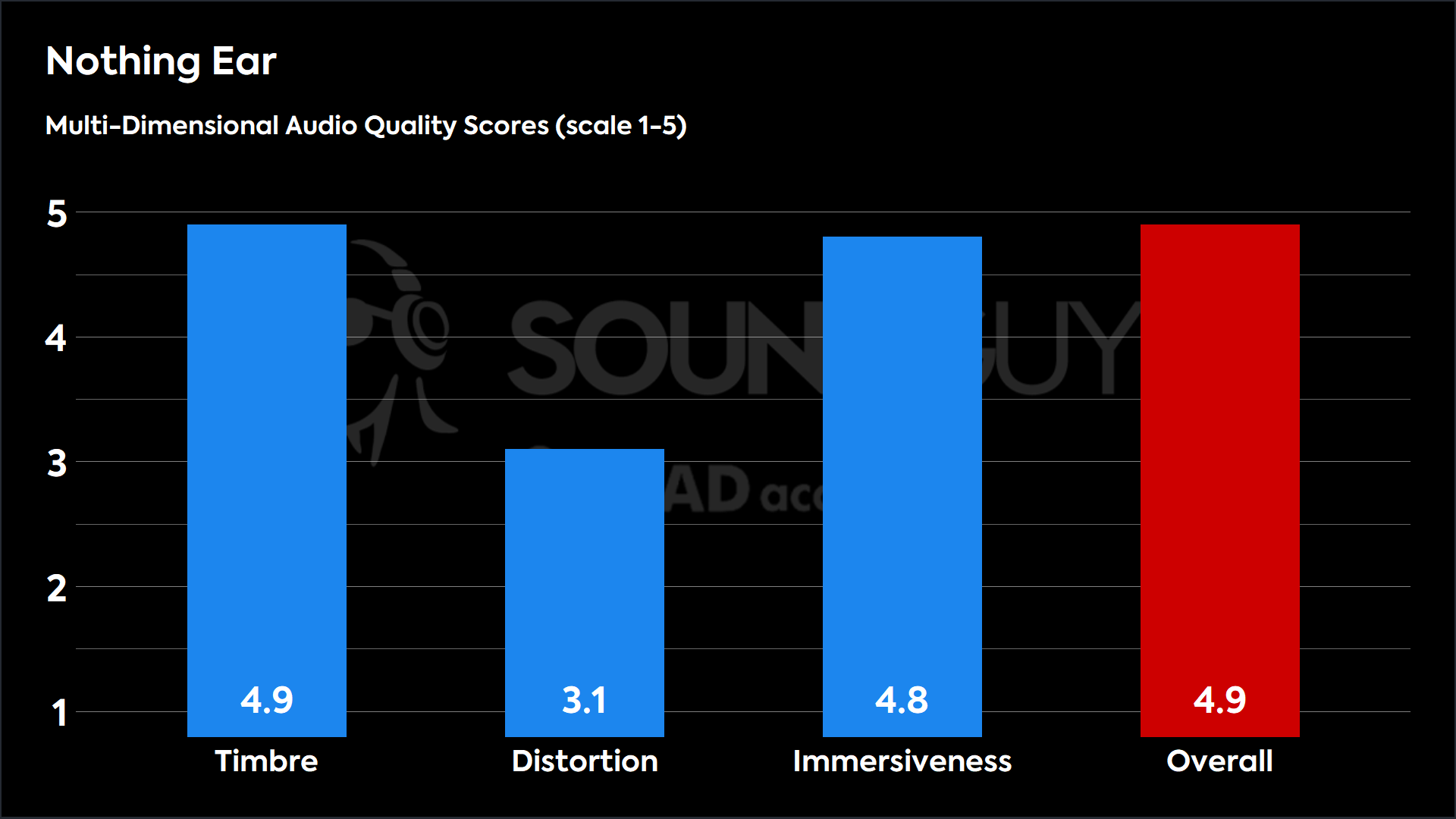
A simulated panel of listeners rates the Nothing Ear very highly in Timbre and Immersiveness. An Overall score of 4.9 is among the highest of the earbuds we’ve tested. Most people will like the way the Nothing Ear sounds straight out of the box.
Loading chart ...
While Nothing promises 45dB of noise attenuation extending up to 5kHz, we aren’t seeing those results in our testing lab. Our testing shows about 20dB of attenuation from the ANC in the low frequencies and then about 30dB of total attenuation in the high frequencies from passive isolation. This reduces the loudness of most sounds by around 75%. While this isn’t as good as the best noise canceling earbuds, it’s still pretty good.
The EarPods (USB-C) is the best budget option for wired listening
Apple’s wired EarPods (USB-C) are an unexpected gem in the tech giant’s shift towards USB-C. For only $20, these EarPods challenge the notion that good sound and functionality have to come with a high price tag. They’re equipped with an inline remote, providing seamless control over playback and volume, and offer a zero-latency experience suitable for real-time audio tasks like video editing or music composing.
Reasons to Buy:
- Very affordable price point
- Zero-latency audio experience
- Inline remote for easy control
- Decent microphone quality for calls
- Compatibility with new USB-C iPhones
- Familiar design for long-time Apple users
Reasons Not to Buy:
- Poor noise isolation
- Lack of bass in audio output
- Not suitable for workouts due to loose fit
- No advanced features (e.g., noise cancelation, app support)
- Sound quality is inferior to more expensive options
Despite their budget-friendly price, these EarPods don’t skimp on microphone quality. Voice recordings during tests yielded impressive results, making these earbuds valuable for anyone involved in frequent online meetings or calls. However, they lack ample noise isolation, so they’re not ideal for noisy environments.
Whether you’re an environmentalist concerned about the waste associated with true wireless earbuds, a professional needing a lag-free audio option, or someone just looking for a reliable, affordable backup, these EarPods offer substantial bang for your buck.

Should you get the AirPods 4 or AirPods 4 with ANC?
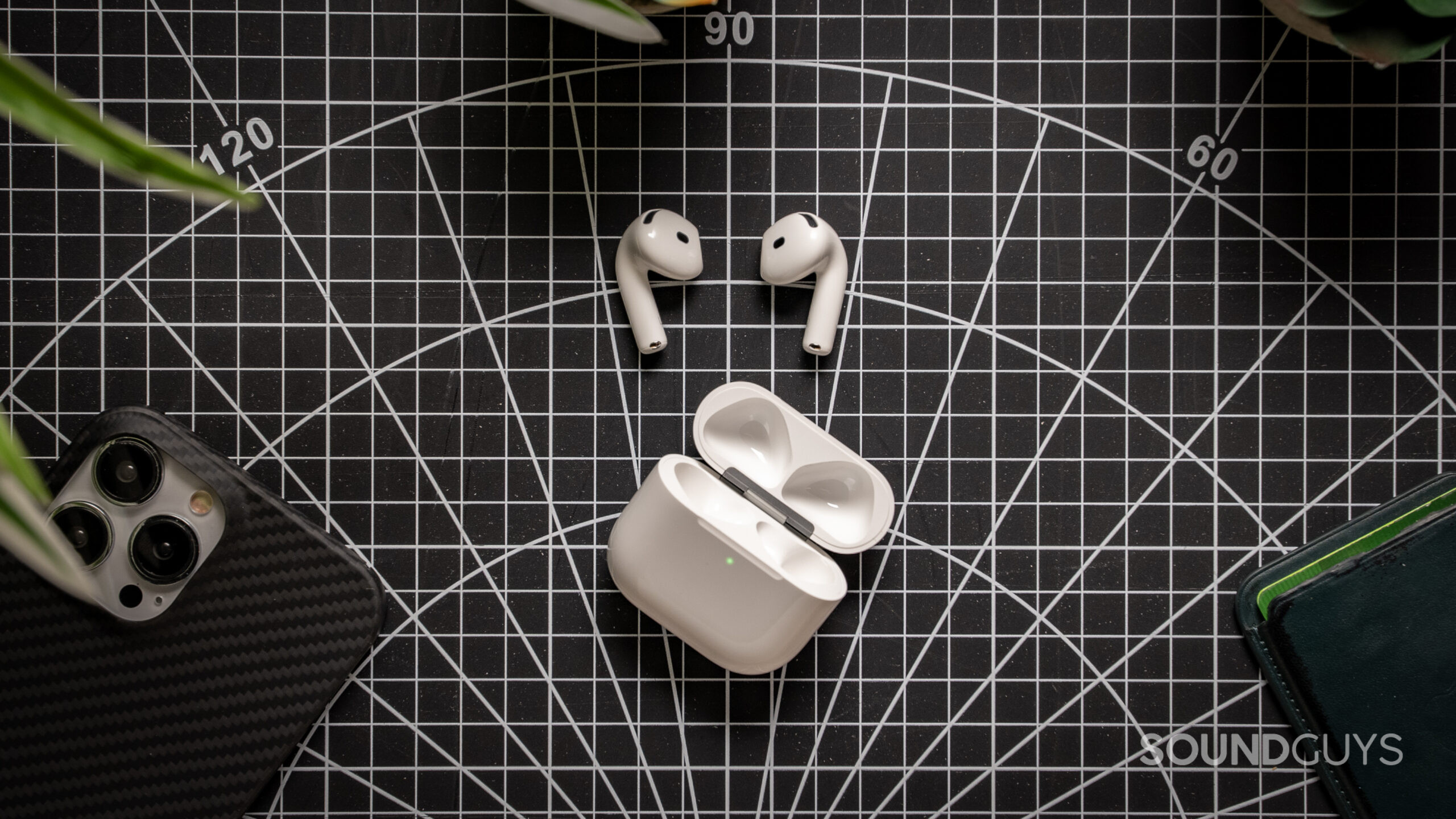
While not taking a spot in our top five, the new AirPods 4 and AirPods 4 with ANC deserve consideration for iPhone users, especially those who prefer an unsealed earbud design. Both models feature an improved fit, the H2 chip for seamless Apple ecosystem integration, and IP54 dust and water resistance. The standard AirPods 4 ($129 at Amazon) offer the most affordable entry into the AirPods lineup, while the ANC version ($119.99 at Amazon) adds active noise cancelation, Adaptive Audio, and Conversation Awareness features.
The unsealed design of both models ensures awareness of your surroundings, but it also limits noise isolation. The ANC version attempts to address this with active noise cancelation, though its effectiveness is somewhat limited by the unsealed design. Both models deliver good sound quality for unsealed earbuds, but they can’t match the audio performance of sealed in-ear options.
For iPhone users deeply invested in the Apple ecosystem, these new AirPods offer solid choices. The standard AirPods 4 provides excellent value for those wanting the classic AirPods experience, while the ANC version caters to users desiring more advanced features. However, if you prioritize sound quality and effective noise isolation, you may want to consider the AirPods Pro 2 or other in-ear alternatives on our top five list. As always with AirPods, we recommend trying them on before purchasing, if possible, as the one-size-fits-all design may not suit all ears.
Should you get the Bose QuietComfort Ultra earbuds?
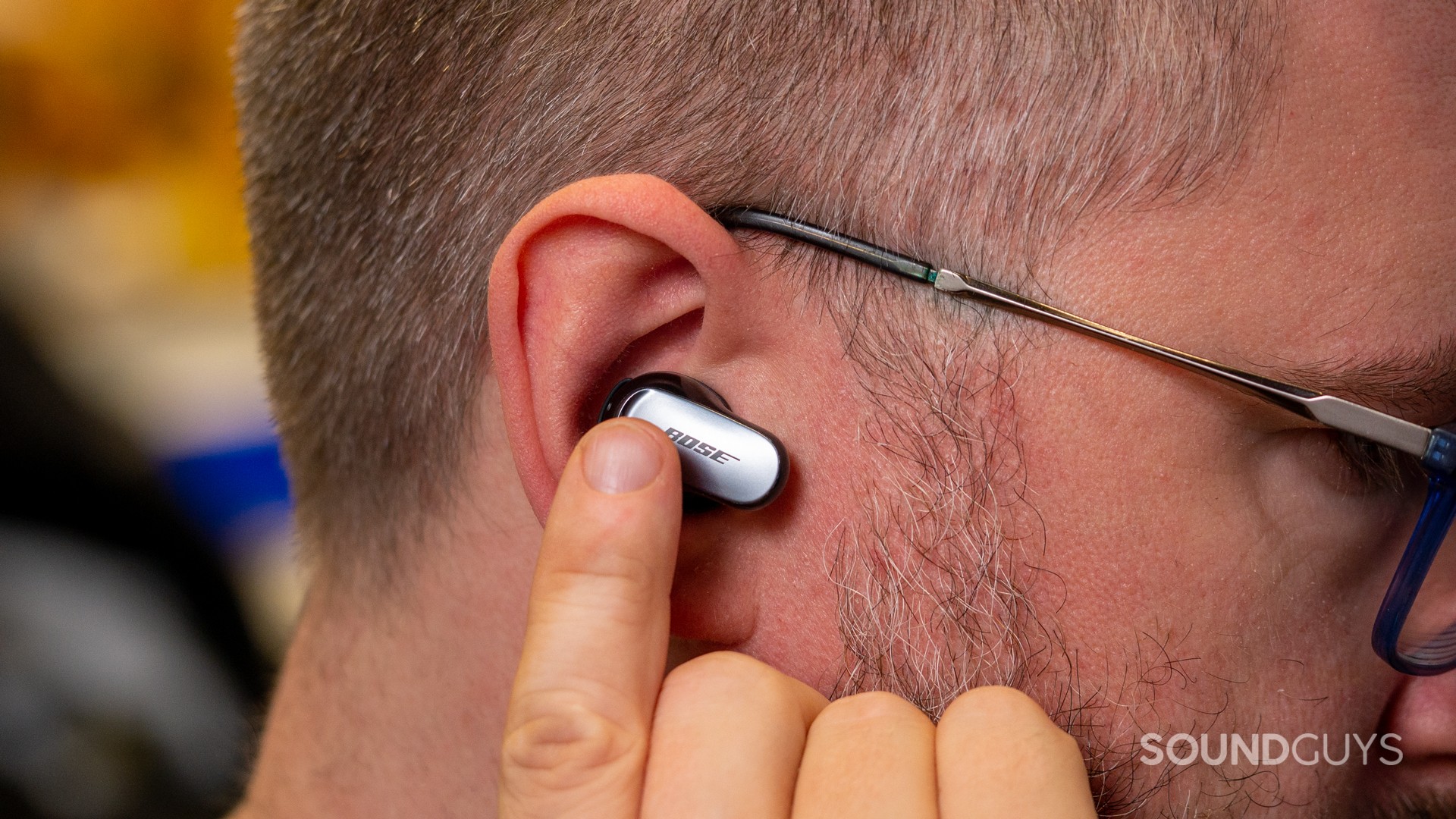
If you find the typical cylindrical nozzle of earbuds uncomfortable, the Bose QuietComfort Ultra Earbuds, as the name suggests, offer a more comfortable alternative design. They may be chunky, but they feature an egg-shaped nozzle that sits more firmly in your ears. The sliding touch controls are more intuitive and avoid tapping gestures that can tend to push earbuds deeper into sensitive ear canals.
However, if you use an iPhone, we still recommend the AirPods Pro over this set of earbuds due to their lower cost, better sound, and iOS-oriented features. Though it’s frustrating that the phone wars bleed over into audio, Apple is playing defense big time here, which means tending its walled garden. For iOS users, there aren’t many audio products that can touch the AirPods in terms of features.

Ready to spend big? Get the Apple AirPods Max headphones
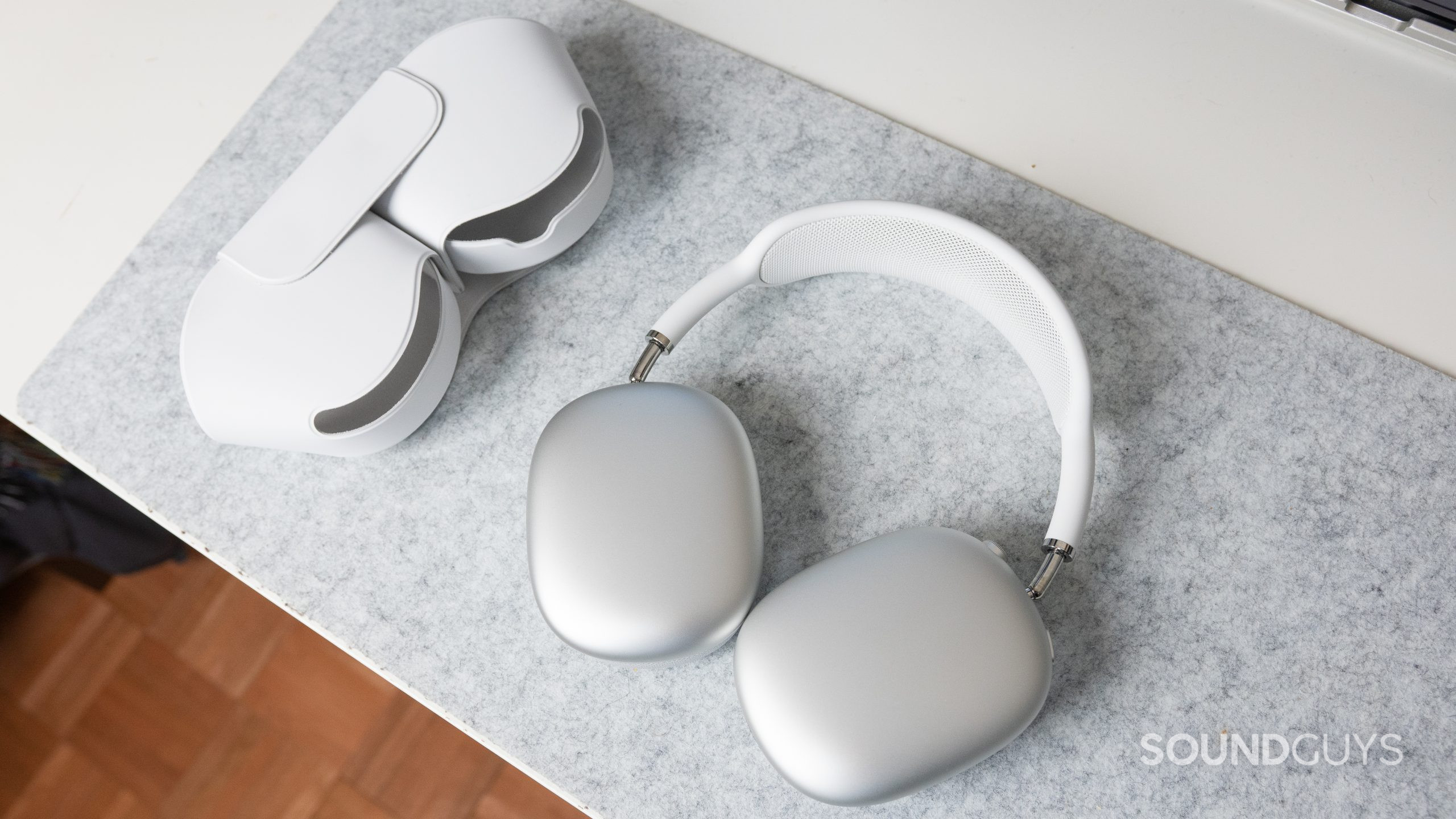
The Apple AirPods Max is the company’s debut over-ear noise canceling headphones, and Apple is confident you’ll want to buy it. So confident, in fact, that it costs $499 at Amazon. While this is certainly cost-prohibitive for many shoppers, those locked into the Apple ecosystem may find the H1 chip conveniences justify the high price. This hybrid noise canceling system outperforms the Sony WH-1000XM4 and Bose QuietComfort 45, Apple’s main competitors in the ANC headphones space.
You also get features like Adaptive EQ and spatial audio with head tracking. The former is a technology we’ve seen from the Apple AirPods Pro, and it makes real-time adjustments to the sound profile depending on how well the headset fits. On the other hand, Spatial Audio is Apple’s take on surround sound and supports 5.1, 7.1, and Dolby Atmos content, which is great for movie playback.
The cost is hard to swallow, but if you want noise canceling headphones that operate seamlessly with your Apple devices, perhaps the AirPods Max is worth the purchase in 2024. At least the updated version comes with a more modern USB-C port and a few new color options, even if we were hoping for more.


Take SoundGuys’ quiz to find your best fit
The best iPhone earbuds: Notable mentions
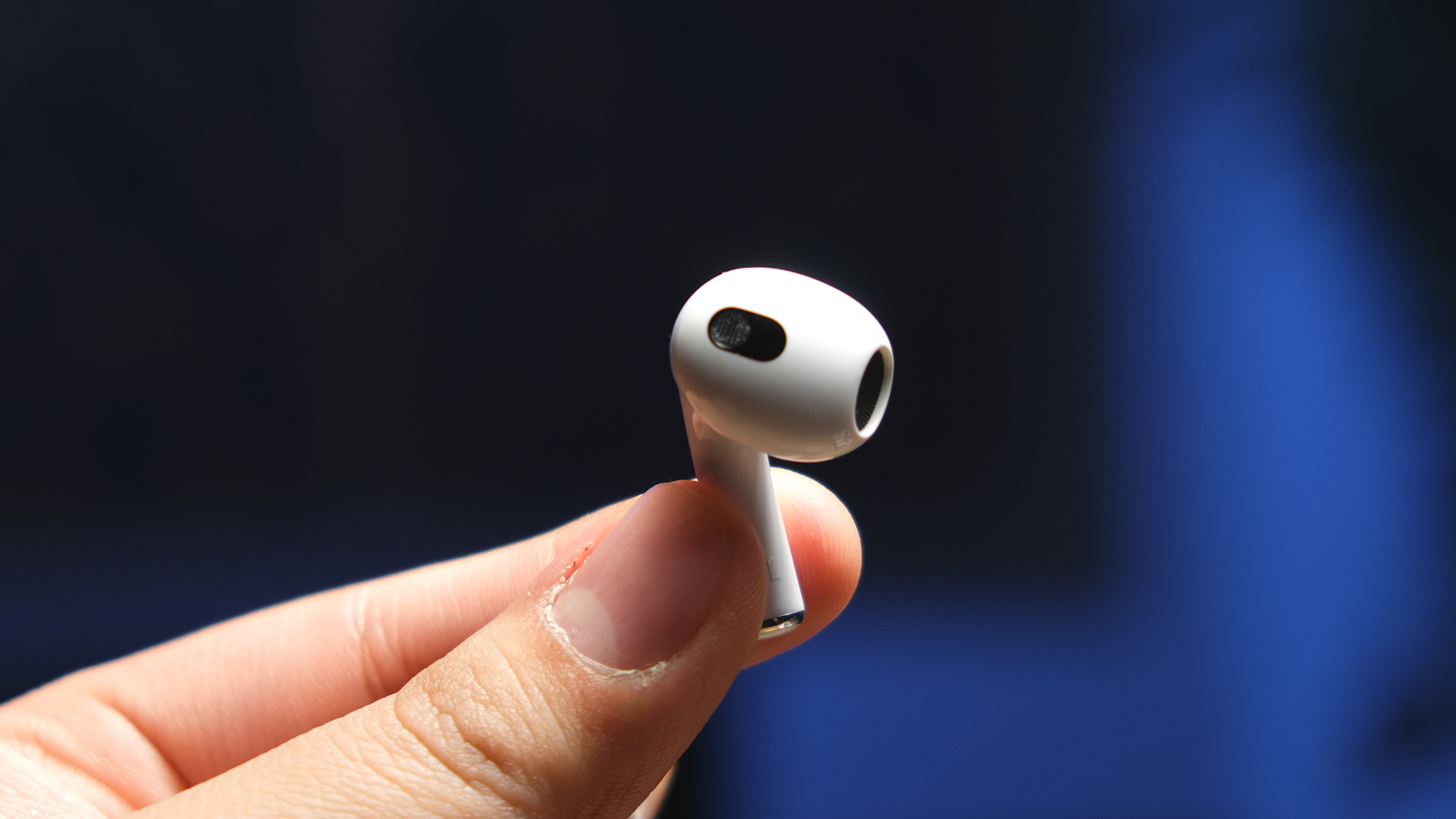
- Anker Soundcore Space A40 ($79 at Amazon): This relatively inexpensive set of earbuds offers excellent noise canceling, a pretty good sound, and the AAC codec you’ll need.
- Anker Soundcore Liberty 4 NC ($99.99 at Amazon): If you want great sound quality and noise canceling at an affordable price, you should definitely consider the Anker Soundcore Liberty 4 NC.
- Apple AirPods Pro (1st Gen) (on the product’s website): The first-gen AirPods Pro shares many of the same features as the second-gen. You get noise canceling, Adaptive EQ, seamless device switching across Apple devices, and more. It uses the H1 chip rather than the latest H2.
- Apple AirPods (3rd Gen) ($195 at Amazon): It has come a long way since the first model back in 2017. The fit is still loose with basically no isolation, but sound quality has improved, and you now get spatial audio and a suite of other features. We still recommend the AirPods Pro over the AirPods (3rd gen), but at least this unsealed headset has an IPX4 rating.
- Beats Studio Buds ($99 at Amazon): Apple packed great sound quality into these great-fitting and compact earbuds. The Beats Studio Buds also support quick pairing with Android devices and charge via USB-C. The downside is that you don’t get any H1 chip with it, and the ANC is not very impressive.
- Beats Studio Buds Plus ($169 at Amazon): The updated version of the original Beats Studio Buds now has much-improved noise canceling. These lack the H1 and H2 chip and an equalizer, but they sound decent for the price.
- Bose Sport Earbuds ($165 at Amazon): This is one of the latest wireless earbuds Bose has to offer, featuring a sleek design, IPX4 water-resistant build, and intuitive touch controls.
- Denon AH-C830NCW (£139 at Amazon Site): This set of noise canceling earbuds connects over AAC, which suits iPhone users just fine, and it looks the part with long stems reminiscent of the AirPods Pro. It comes in black too.
- Grell Audio TWS 1 ($216.81 at Amazon): Designed by former Sennheiser engineer Axel Grell, these buds have a great frequency response and a ton of features, including SoundID and noise cancelation.
- Jabra Elite 7 Active ($179 at Amazon): Jabra ups the game with this one aimed at the fitness crowd. It supplies a very nice frequency response, grippier ear tips, and a robust IP57 rating. Jabra also ships with a no-fuss replacement warranty, which, if you’re going to test the Elite 7 Active IP rating, it’s nice to have.
- LG TONE Free FP9 ($103 at Amazon): When these initially came out, they were kind of expensive for what they do. Now that the price has decreased, they’re a good deal with pretty decent ANC and a familiar, lightweight AirPods-style shape.
- Nothing Ear (a) ($95 at Amazon): If you have $100 to spend on earbuds, the Nothing Ear (a) are a good option. These jack-of-all-trades earbuds don’t excel in any particular way, but also don’t have any major drawbacks.
- Nothing Ear 2 ($149 at Amazon): Besides a more trebly default frequency response, Ear (2) bests the previous Ear 1 in every way. You get better ANC, a smaller package, IP54-rated buds, and squeezable stems.
- Sennheiser Sport True Wireless ($99 at Amazon): For the active folks out there who want a set of good-sounding and reliable earbuds without noise canceling. These compact earbuds offer an IP54 rating with secure in-ear wings in a compact package.
- Skullcandy Mod XT ($48 at Amazon): If you’re searching for some more affordable earbuds to mate with your iPhone, the Skullcandy Mod XT is hard to beat. Its sound has a lower end than our ideal, but not by a lot. It also isolates rather well, even if it lacks ANC. It does all of the basic stuff fairly well at this price point.
- Sony LinkBuds WF-L900 ($178 at Amazon): If you must have earbuds that don’t seal to your ears, check out the LinkBuds. Sony’s donut-shaped earphones leave your ear canals completely unoccluded, so you can enjoy music while hearing your surroundings.
- Sony WF-C500 ($98 at Amazon): For people who just want good-sounding, functionally effortless earbuds, the WF-C500 is a great all-around choice.
What you should know about the best earbuds for iPhone
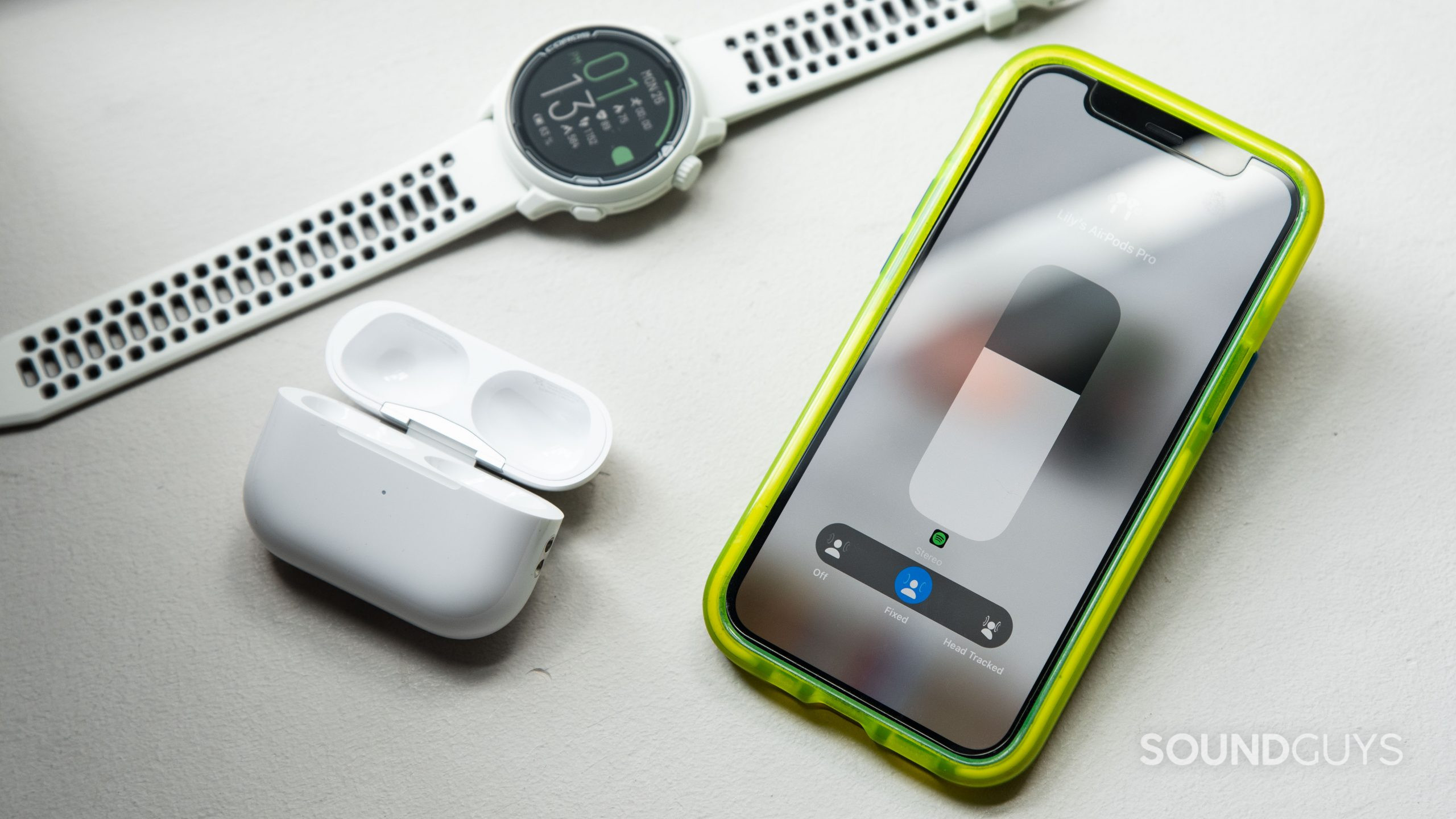
Several key factors must be considered when choosing the best earbuds for your iPhone. This guide will help you make an informed decision based on your needs and preferences.
Spatial Audio
Apple’s Spatial Audio technology offers a surround sound experience for specially mixed tracks on Apple Music and Amazon Music Unlimited. Similar to Sony’s 360 Reality Audio and Samsung’s 360 Audio, it creates a 3D soundscape around your head. When paired with an iOS device, it can even track your head movements, adjusting the sound for a more immersive experience. Not all Apple earbuds support this feature, so check the specifications if it’s important to you.
Bluetooth Codecs
For iPhone users, the AAC (Advanced Audio Codec) is the most important Bluetooth codec to look for. Apple devices don’t support other high-quality codecs like aptX or LDAC, so AAC is your best option for wireless audio quality. While AAC isn’t CD quality, it performs well on Apple devices. Most earbuds support AAC, but it’s always worth double-checking.
Note: If you use your earbuds with non-Apple devices as well, you might want to consider models that support additional codecs for better compatibility across different platforms.
Battery Life
When choosing earbuds, consider how long you typically listen to music each day. Our surveys show that most users listen between one and two hours daily. For true wireless earbuds, we conduct objective battery life tests using constant output at 75dB(SPL) to provide reliable comparisons between products.
Sound Quality
While a neutral frequency response is ideal for accurate audio reproduction, many listeners prefer a more “fun” or “energetic” sound profile. Our preference curve balances accuracy with enjoyment, featuring a slightly emphasized low-end for liveliness and boosted treble for perceived clarity.
Key point: Sound quality is subjective, and what sounds best to you may differ from others. If possible, try out different earbuds to find the sound profile you prefer.
Fit and Comfort
The fit of your earbuds is crucial for both sound quality and comfort. A proper seal helps isolate external noise and improves bass response. Some users might find alternatives more comfortable than AirPods, especially those who struggle with the fit of non-Pro AirPods models.
Tip: Look for earbuds that come with multiple ear tip sizes to ensure the best fit for your ears.
Additional Features to Consider
- Water resistance (IP rating) for workout use
- Noise cancelation capabilities
- Transparency mode for hearing your surroundings
- Integration with Apple ecosystem (e.g., “Hey Siri” support, automatic device switching)
- Case charging options (wireless charging, MagSafe compatibility)
By considering these factors, you’ll be better equipped to choose the best Apple earbuds for your specific needs and preferences.
How we test the best iPhone earbuds
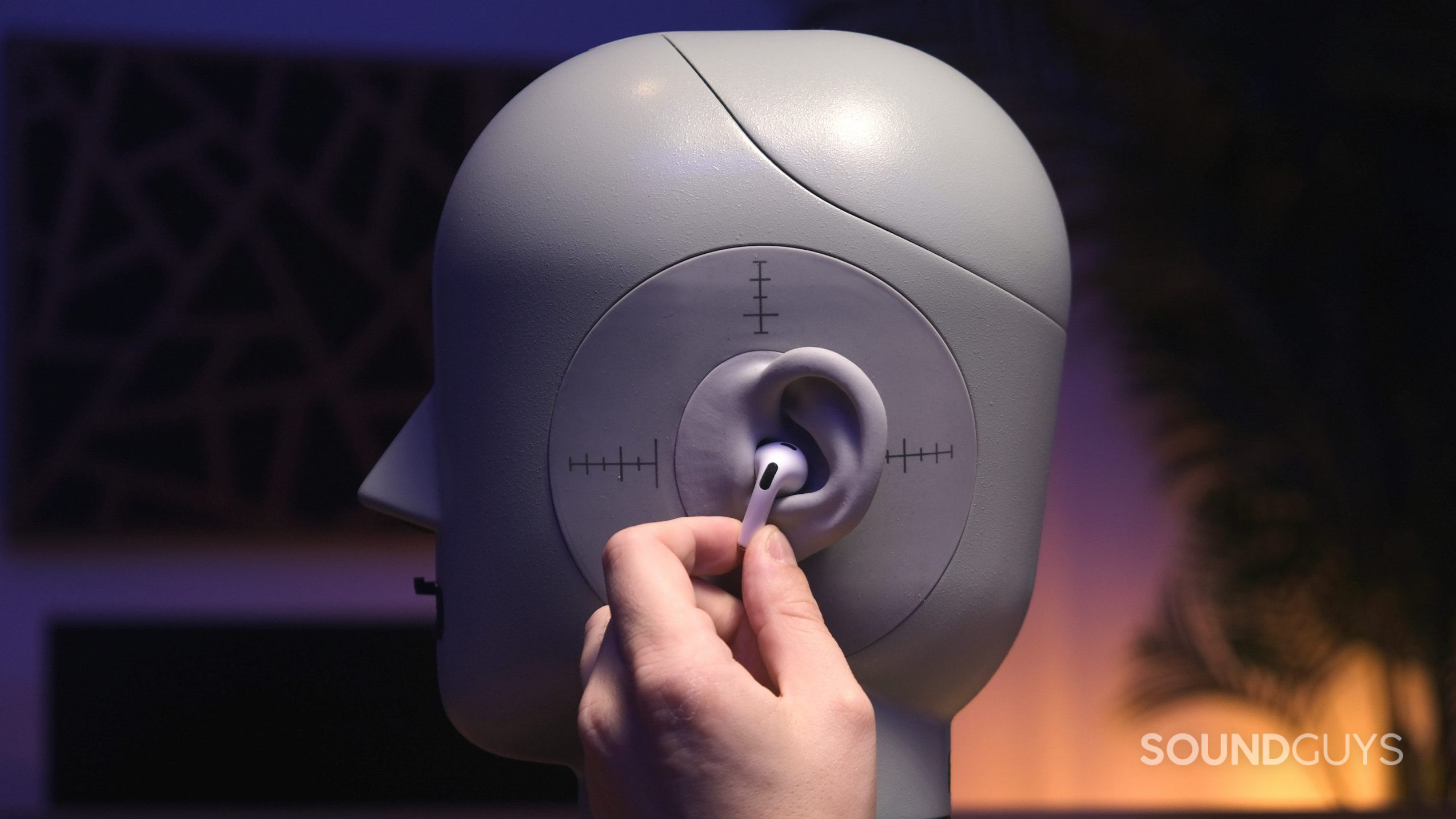
We subject each candidate and pick to our battery of objective testing, which includes isolation, frequency response, and battery life. We respect that listening is a subjective experience while acknowledging that sound can be measured and discussed objectively simultaneously.
Yes, our trio of tests are fundamental, but they analyze what consumers care about the most as it applies to the best iPhone earbuds and wireless earbuds in general. Regarding battery life readouts, your mileage will likely vary depending on how loudly you listen to your music. To combat this variance, we subject each unit to constant music playback that peaks at 75dB(SPL). Additionally, in most cases, you can improve isolation by using third-party ear tips.
Why you can trust SoundGuys
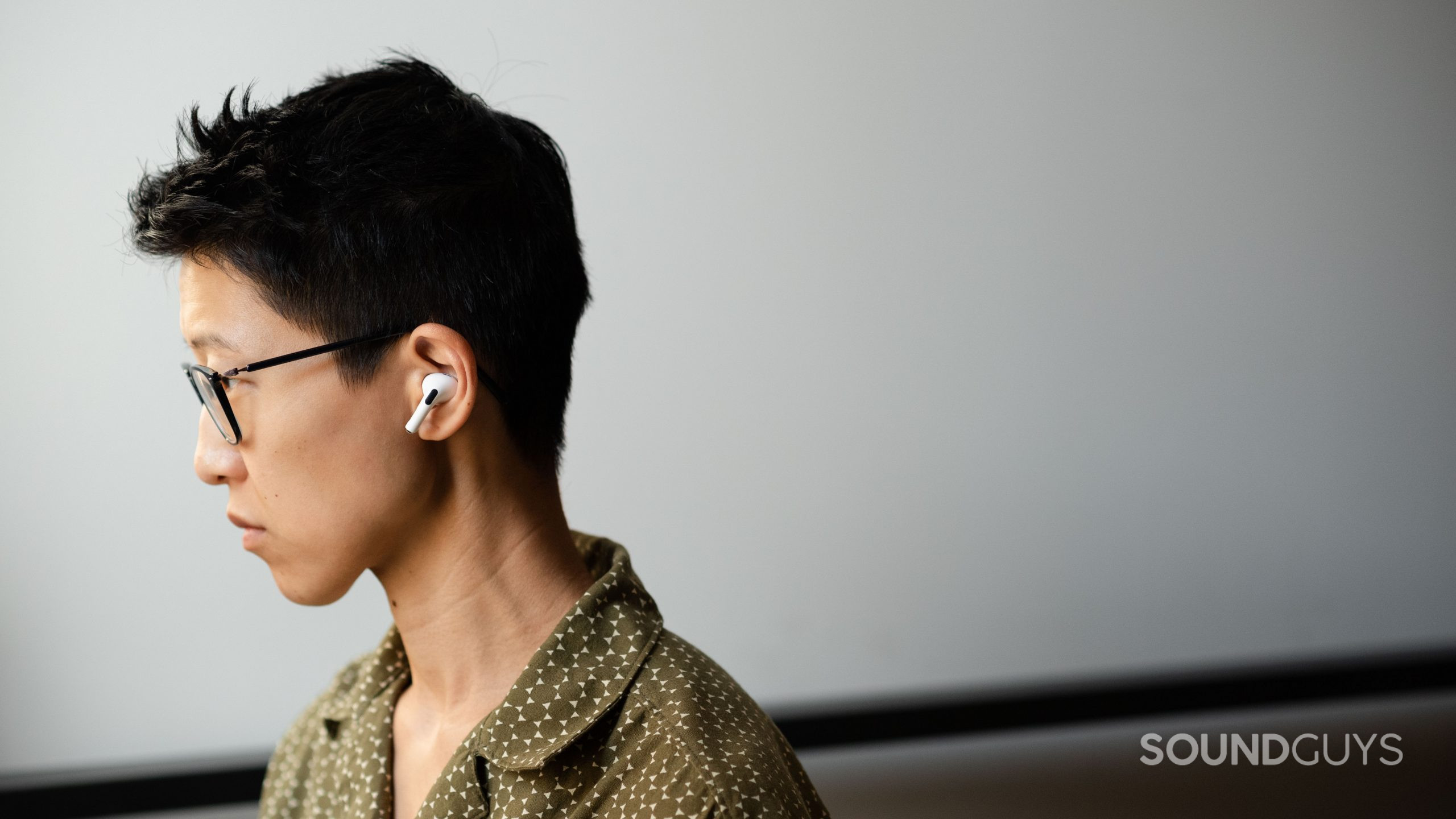
Working at SoundGuys serves as each of our day jobs; yes, it is a dream. We get paid to listen and test as many products as possible while constantly researching, so our opinions aren’t influenced by the companies manufacturing them. If we don’t like something, we say it. Simple as that. Additionally, each of us has several years involved in the audio community. After keeping up with the audio industry for years, we can quickly tell the gimmicks from the goldmines. If you have the time or desire, please read our full ethics policy.
- February 6, 2025: We added the AirPods 4 to our Top Picks.
- November 19, 2024: Added the Anker Soundcore Liberty 4 NC as a notable mention.
- September 24, 2024: We added a section on the AirPods 4 and AirPods 4 with ANC and added details on the USB-C AirPods Max.
- August 27, 2024: We added reasons to buy and not to buy for each top pick, added missing alt text to some of the frequency response charts, and reformated the ‘What you need to know’ for clarity.
- July 25, 2024: We added a new top pick and removed some older products in the notable mentions section.
Frequently asked questions about iPhone earbuds
The best Apple wireless earphone is the Apple AirPods Pro (2nd generation). Its seamless integration with iOS devices, improved active noise canceling (ANC) due to the new H2 chip, enhanced transparency mode, and numerous sensors make it a top choice for iPhone users.
The Beats Powerbeats Pro offer additional features over the standard (discontinued) Beats Powerbeats, including a prolonged battery life, true-wireless design, and an IPX4 water resistance rating. This expanded feature set does come at a cost, putting both earbuds in two different price brackets. We’ve directly compared the Beats Powerbeats Pro and Beats Powerbeats, so you don’t have to guess.
The AirPods Pro offers additional features over its non-pro counterpart, such as active noise canceling and interchangeable ear tips. We have compared the AirPods Pro (1st generation) and AirPods Pro (2nd generation).
Yes, any of the listed wireless products are also compatible with Android and any Bluetooth-enabled device. We selected our picks as the best iPhone earbuds because they have iOS-friendly features like AAC support or, in the case of the AirPods Pro, H1 chip integration.
Generally speaking, we’d still recommend the Apple AirPods Pro (2nd generation), because if your music is already mixed to sound bass-heavy, the AirPods Pro (2nd generation) frequency response will relay that to your ears. Plus, it simply works well with iPhones. On the other hand, if you mean that you like to listen to even more bass volume than is already present on any track, you might like the Bose QuietComfort Earbuds II, which drastically boosts bass frequency volumes while offering excellent noise cancelation and an easy to use design.
Before purchasing new earbuds, try running through some troubleshooting with your AirPods. For example, factory resetting or deleting all other devices except your iPhone could solve your disconnection issue. Either way, we feel your pain; Bluetooth connectivity can frustrate even the most patient people. In our testing, we did not run into connection problems, but there are also a lot of uncontrollable variables at play, even when comparing the same earbuds. If you’ve exhausted the troubleshooting, contact Apple customer support and try the Sony WF-1000XM4 or Sennheiser MOMENTUM True Wireless 3 earbuds. Both are pretty solid performers.
We gave the Apple AirPods Pro (2nd generation) a score of 7.9. They are considered one of the best true wireless earbuds for iOS users due to their impressive ANC, comfortable fit, wireless charging, and the integration of the H2 chip, which offers better noise canceling and battery life.
Yes, you can use any Bluetooth earbuds with an iPhone 13, such as the Sony WF-1000XM5 or the Bose QuietComfort II. However, for the best experience, it’s recommended to use earbuds that support the AAC codec, as this is the primary codec supported by Apple devices.